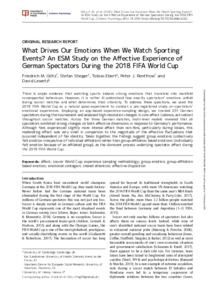|
What drives our emotions when we watch sporting events? An ESM study on the affective experience of German spectators during the 2018 FIFA World Cup
Götz, Friedrich M.
;
Stieger, Stefan
;
Ebert, Tobias
;
Rentfrow, Peter J.
;
Lewetz, David
![[img]](https://madoc.bib.uni-mannheim.de/58652/1.hassmallThumbnailVersion/262-4300-1-pb.pdf)  Vorschau |
|
PDF
262-4300-1-pb.pdf
- Veröffentlichte Version
Download (3MB)
|
|
DOI:
|
https://doi.org/10.1525/collabra.262
|
|
URL:
|
https://madoc.bib.uni-mannheim.de/58652
|
|
Weitere URL:
|
https://online.ucpress.edu/collabra/article/6/1/15...
|
|
URN:
|
urn:nbn:de:bsz:180-madoc-586528
|
|
Dokumenttyp:
|
Zeitschriftenartikel
|
|
Erscheinungsjahr:
|
2020
|
|
Titel einer Zeitschrift oder einer Reihe:
|
Collabra: Psychology
|
|
Band/Volume:
|
6
|
|
Heft/Issue:
|
1
|
|
Seitenbereich:
|
Article 15
|
|
Ort der Veröffentlichung:
|
Oakland, CA
|
|
Verlag:
|
University of California Press
|
|
ISSN:
|
2474-7394
|
|
Verwandte URLs:
|
|
|
Sprache der Veröffentlichung:
|
Englisch
|
|
Einrichtung:
|
Außerfakultäre Einrichtungen > MZES - Arbeitsbereich A
|
|
Bereits vorhandene Lizenz:
|
 Creative Commons Namensnennung 4.0 International (CC BY 4.0) Creative Commons Namensnennung 4.0 International (CC BY 4.0)
|
|
Fachgebiet:
|
300 Sozialwissenschaften, Soziologie, Anthropologie
|
|
Abstract:
|
There is ample evidence that watching sports induces strong emotions that translate into manifold consequential behaviours. However, it is rather ill-understood how exactly spectators’ emotions unfold during soccer matches and what determines their intensity. To address these questions, we used the 2018 FIFA World Cup as a natural quasi-experiment to conduct a pre-registered study on spectators’ emotional experiences. Employing an app-based experience-sampling design, we tracked 251 German spectators during the tournament and assessed high-resolution changes in core affect (valence, activation) throughout soccer matches. Across the three German matches, multi-level models revealed that all spectators exhibited strong changes on both affective dimensions in response to Germany’s performance. Although fans experienced slightly more intense affect than non-fans, particularly during losses, this moderating effect was very small in comparison to the magnitude of the affective fluctuations that occurred independent of fan identity. Taken together, the findings suggest group emotions (collectively felt emotion irrespective of individual affiliation) rather than group-affiliation based emotions (individually felt emotion because of an affiliated group), as the dominant process underlying spectator affect during the 2018 FIFA World Cup.
|
|
Zusätzliche Informationen:
|
Online-Ressource
|
 | Dieser Eintrag ist Teil der Universitätsbibliographie. |
 | Das Dokument wird vom Publikationsserver der Universitätsbibliothek Mannheim bereitgestellt. |
 Suche Autoren in Suche Autoren in
BASE:
Götz, Friedrich M.
;
Stieger, Stefan
;
Ebert, Tobias
;
Rentfrow, Peter J.
;
Lewetz, David
Google Scholar:
Götz, Friedrich M.
;
Stieger, Stefan
;
Ebert, Tobias
;
Rentfrow, Peter J.
;
Lewetz, David
Sie haben einen Fehler gefunden? Teilen Sie uns Ihren Korrekturwunsch bitte hier mit: E-Mail
Actions (login required)
 |
Eintrag anzeigen |
|
|



 Creative Commons Namensnennung 4.0 International (CC BY 4.0)
Creative Commons Namensnennung 4.0 International (CC BY 4.0) Suche Autoren in
Suche Autoren in